Three hours off work to watch the World Cup: Welcome to Brazil
Government institutions and private companies provide employees the time and resources to see their team during the soccer tournament in Qatar
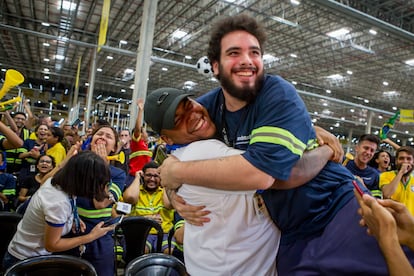

In Brazil, World Cup fever is sweeping across the country. The entire nation adapts so that everyone, from the kindergarten children to the hundreds of thousands of public officials, can watch the games and support the national team. There is a reason why this is considered the country of soccer, and it has won five cups – more than any other ream. The national sport is one of the few things that always manages to unite this giant of inequality and classism. Indeed, companies have organized so that workers don’t have to miss a single minute of the game. That is why on Thursday, São Paulo’s rush hour happened much earlier than usual: nobody wanted to be late for the Brazil-Serbia game. By that time, the bars were already full of people wearing the yellow shirt in support of Brazil. Jair Bolsonaro, the outgoing president of Brazil, had tried to turn the national colors into a political statement, but many want to reclaim is as a source of national pride.
Ítalo Oliveira, 19, feared he would miss the big soccer event because of work, but he was greatly surprised when the boss informed the staff that they would get three hours off to see Brazil’s debut match. “It was a surprise because our work never stops,” he explains during halftime, after watching a dull first half with more than a thousand colleagues sitting in front of two enormous screens set up for the occasion in a giant warehouse located in Cajamar, an hour’s drive from São Paulo.
When Richarlison scores a goal – his second – things go wild. The workers burst with excitement, jumping euphorically on their chairs. They play vuvuzelas (plastic trumpets) and chant: “Brazil, Brazil.” Many changed their uniforms for the shirt of the national team. Someone dyed their hair green. They are delighted. Their team started off on the right foot and is on its way to making history, again, by winning a sixth cup in Qatar.
The celebration is taking place next to a plant that is normally never a standstill. This is one of the distribution centers of Mercado Libre, the Latin American e-commerce giant, a sort of Argentinian Amazon. This is not just any day: it is Brazil’s first game and the following day is Black Friday, one of the most important days in this business. That is why the press was invited. Watching the game in a company like this makes one understand why businesses offer such perks and why in some countries the passion for soccer is so widespread, even if for some it is only a love that they rekindle every four years.

In this plant, employees work in shifts to cover 24 hours a day, seven days a week, only stopping on Christmas, New Year’s Day and now, when Brazil plays in the World Cup. “When they told us that my team would get a break, we began to celebrate, to pick our clothes and makeup,” explains Talita Neves, 21. Both she and Oliveira work around the gigantic warehouse, preparing orders that will later be packed and shipped to their destinations. When they have a problem, they turn to colleagues like Lesli Oblesrczuk, 27, who tells them what to do when a product turns out to be missing or is not where it should be. She says that these days are usually hectic, because both the sales volume and the teams are larger.
Three out of every four Brazilian companies give their employees permission to watch the matches. The trickle of ads has been incessant in recent weeks. Public libraries, schools, restaurants, small clothing stores; even banks. They have all been announcing to users, parents and customers in general what the schedules will be on the days that the Brazilian team plays. As the championship progresses, the calendar adapts. One can tell that it is a deep-rooted custom because everyone takes it with absolute normality. Something similar happens in Argentina.
The federal, state and local governments have all issued decrees with the schedules and the warning that officials will have to make up for the hours they devote to following the tournament. In private companies, that is negotiable. The priority is usually to keep the harmony and make the staff happy.
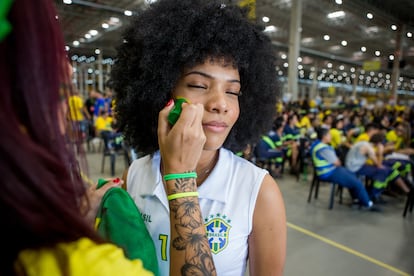
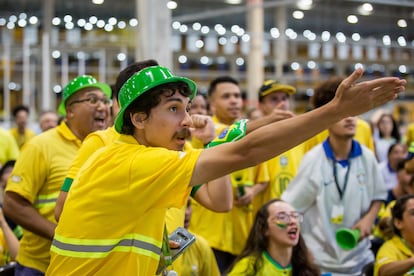
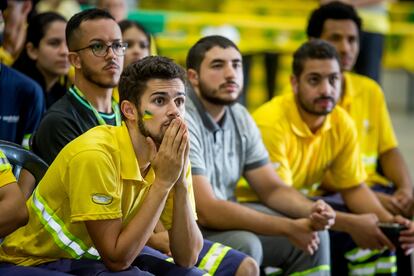

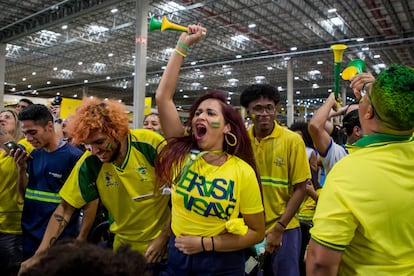
Among the 14,000 Mercado Libre employees in Brazil, those who had a shift during the game got free time to watch it, as well as 45 minutes before and after. On Saturday, there is a match between Mexico and Argentina, and operations will stop in those two countries. Then Brazil again on Monday, for the match against Switzerland. The Chile staff will not enjoy similar benefits; their team failed to qualify.
Operations manager Fernanda Cacita, 36, is the boss of Oliveira, Neves and Oblesrczuk. She explains the company’s reasons for offering the workers this soccer leave without affecting their pay or making them compensate for a single minute: “They do it to encourage their commitment. They will be more productive,” she says. “If they are working and have an eye on the game, they will not pay attention to the operation. Better to have a committed team than to compromise the orders.” The point is that the machinery that makes each package arrive at its destination on time works flawlessly, and for that, this huge army of employees must operate like clockwork, something even more important now that the World Cup started so close to Black Friday and will end right before Christmas.
And what happens when the game ends in a big disappointment, like the one Argentina suffered when it lost its first match to Saudi Arabia? They have it all planned, explains the operations manager. After the game and before the employees resume their tasks, each boss holds a briefing with their team. The content depends on the results of the match: they have one for a victory and another for a defeat. This time, the Brazilians got the first one.
Tu suscripción se está usando en otro dispositivo
¿Quieres añadir otro usuario a tu suscripción?
Si continúas leyendo en este dispositivo, no se podrá leer en el otro.
FlechaTu suscripción se está usando en otro dispositivo y solo puedes acceder a EL PAÍS desde un dispositivo a la vez.
Si quieres compartir tu cuenta, cambia tu suscripción a la modalidad Premium, así podrás añadir otro usuario. Cada uno accederá con su propia cuenta de email, lo que os permitirá personalizar vuestra experiencia en EL PAÍS.
¿Tienes una suscripción de empresa? Accede aquí para contratar más cuentas.
En el caso de no saber quién está usando tu cuenta, te recomendamos cambiar tu contraseña aquí.
Si decides continuar compartiendo tu cuenta, este mensaje se mostrará en tu dispositivo y en el de la otra persona que está usando tu cuenta de forma indefinida, afectando a tu experiencia de lectura. Puedes consultar aquí los términos y condiciones de la suscripción digital.








































